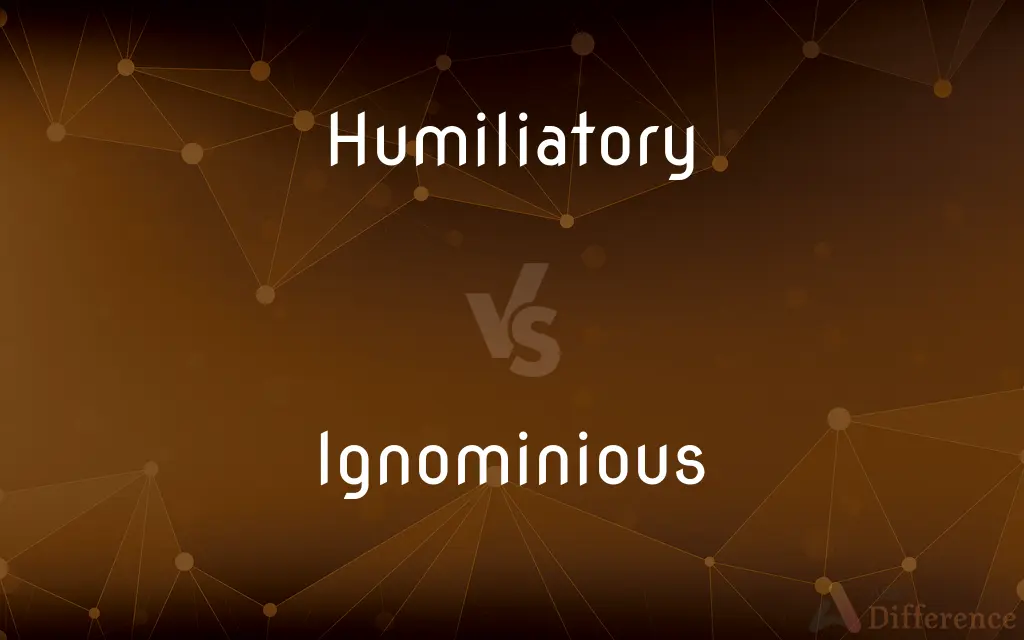Humiliatory vs. Ignominious — What's the Difference?
By Tayyaba Rehman — Published on September 29, 2023
"Humiliatory" refers to actions causing humiliation or lowering dignity, while "ignominious" denotes actions causing public disgrace or shame, often with dishonorable conduct.

Difference Between Humiliatory and Ignominious
Table of Contents
ADVERTISEMENT
Key Differences
"Humiliatory" and "ignominious" refer to concepts related to disgrace and loss of respect, but with nuanced differences. "Humiliatory" relates specifically to actions, situations, or behaviors that cause humiliation, often making someone feel belittled or lowered in dignity. It signifies an action or situation that degrades, diminishes, or debases one's pride or dignity. "Ignominious," on the other hand, relates more to actions or situations that bring about public disgrace or shame, often connected to dishonorable conduct or actions that are socially condemned.
"Humiliatory" actions or circumstances are typically those that make someone feel ashamed or small in a more personal or internal sense. It can refer to experiences that demean or degrade an individual, impacting their self-respect and sense of worth. "Ignominious" incidents, conversely, emphasize the external, public aspect of disgrace, often involving actions that are socially or morally reprehensible and that lead to public derision or condemnation.
"Humiliatory" implies a reduction in one's sense of value or worth, focusing more on the internal experience of shame or embarrassment. It's about the subjective experience of feeling belittled or demeaned. In contrast, "ignominious" implies a more objective, outward disgrace, often involving actions that are widely recognized as dishonorable or shameful, resulting in a loss of reputation or esteem in the eyes of others.
Both "humiliatory" and "ignominious" represent negative states of being, involving loss of respect, esteem, or dignity, but they differ in their emphasis and scope. "Humiliatory" actions are those that cause a feeling of humiliation, often more internally felt, whereas "ignominious" actions are those that result in public disgrace, being more externally perceived and related to one’s reputation in society.
Comparison Chart
Definition
Related to causing humiliation or lowering dignity
Related to actions causing public disgrace or shame
ADVERTISEMENT
Focus
More on internal, personal sense of humiliation
More on external, public, and societal disgrace
Scope
Personal feeling of being belittled or demeaned
Publicly recognized as dishonorable or shameful
Application
More subjective, internal experience of shame
More objective, involves loss of reputation or esteem
Consequence
Loss of self-respect or sense of worth
Loss of honor and societal condemnation
Compare with Definitions
Humiliatory
Humiliatory refers to causing humiliation or a feeling of being belittled.
The teacher’s humiliatory remarks made the student feel worthless.
Ignominious
Ignominious denotes being marked by disgrace or shame.
The politician faced an ignominious end to his career.
Humiliatory
Humiliatory denotes actions or situations that degrade or diminish one’s dignity.
The employee endured the humiliatory treatment by his manager silently.
Ignominious
Ignominious refers to causing public disgrace or shame due to dishonorable conduct.
His ignominious actions led to widespread condemnation.
Humiliatory
Humiliatory implies causing a loss of pride or self-respect.
The humiliatory defeat left the team demoralized.
Ignominious
Ignominious signifies a state of being disgraced or humiliated publicly.
The ignominious defeat was a blow to the country’s pride.
Humiliatory
Humiliatory signifies lowering someone's worth or value.
The humiliatory comments were uncalled for and hurtful.
Ignominious
Ignominious implies a loss of reputation due to dishonorable actions.
The company had an ignominious downfall due to fraudulent activities.
Humiliatory
Humiliatory involves making someone feel small or lessened in value.
The leader’s humiliatory approach led to a lack of respect among the followers.
Ignominious
Ignominious involves actions or situations that are reprehensible and shameful.
The criminal lived an ignominious life, shunned by society.
Humiliatory
Humiliating
Ignominious
Deserving or causing public disgrace or shame
No other party risked ignominious defeat
Ignominious
Characterized by or deserving shame or disgrace
"It was an ignominious end ... as a desperate mutiny by a handful of soldiers blossomed into full-scale revolt" (Harry Anderson).
Ignominious
Degrading; debasing
"The young people huddled with their sodden gritty towels and ignominious goosebumps inside the gray-shingled bathhouse" (John Updike).
Ignominious
Marked by great dishonor, shame, disgrace or humiliation; shameful, disgraceful
Ignominious
Marked with ignominy; incurring public disgrace; dishonorable; shameful.
Then first with fear surprised and sense of pain,Fled ignominious.
Ignominious
Deserving ignominy; despicable.
One single, obscure, ignominious projector.
Ignominious
Humiliating; degrading; as, an ignominious judgment or sentence.
Ignominious
(used of conduct or character) deserving or bringing disgrace or shame;
Man...has written one of his blackest records as a destroyer on the oceanic islands
An ignominious retreat
Inglorious defeat
An opprobrious monument to human greed
A shameful display of cowardice
Common Curiosities
Can "humiliatory" relate to personal experiences of shame?
Yes, "humiliatory" often relates to more personal, internal experiences of shame or embarrassment.
Does "ignominious" involve a loss of public reputation?
Yes, "ignominious" typically involves a loss of public reputation and societal esteem.
Is "humiliatory" focused more on the internal feeling of being demeaned?
Yes, "humiliatory" focuses more on the internal, subjective experience of being demeaned or degraded.
Does "humiliatory" often imply a reduction in one’s sense of worth?
Yes, "humiliatory" implies a reduction in one's sense of value or worth, impacting self-respect.
What does "humiliatory" imply?
"Humiliatory" implies actions or situations causing humiliation or a feeling of being belittled.
Can "humiliatory" actions make someone feel small or inferior?
Absolutely, "humiliatory" actions can make an individual feel belittled, inferior, or lessened in value.
Does "ignominious" depict a state of public humiliation?
Yes, "ignominious" depicts a state of being disgraced or humiliated in a public or societal context.
Can "humiliatory" relate to actions that lower someone’s dignity?
Yes, "humiliatory" specifically relates to actions or situations that lower someone’s dignity or self-worth.
What does "ignominious" signify?
"Ignominious" signifies actions causing public disgrace or shame due to dishonorable conduct.
Is "ignominious" associated with actions widely recognized as shameful?
Yes, "ignominious" is associated with actions that are publicly and widely recognized as dishonorable or shameful.
Can "ignominious" refer to actions that are morally reprehensible?
Absolutely, "ignominious" often refers to actions that are socially or morally reprehensible and shameful.
Is an "ignominious" end often associated with disgrace?
Absolutely, an "ignominious" end is often associated with a considerable amount of public disgrace or shame.
Can "humiliatory" comments be considered as degrading or demeaning?
Yes, "humiliatory" comments are considered degrading and demeaning, causing a loss of self-respect.
Share Your Discovery

Previous Comparison
Impeachment vs. Conviction
Next Comparison
Supply vs. DemandAuthor Spotlight
Written by
Tayyaba RehmanTayyaba Rehman is a distinguished writer, currently serving as a primary contributor to askdifference.com. As a researcher in semantics and etymology, Tayyaba's passion for the complexity of languages and their distinctions has found a perfect home on the platform. Tayyaba delves into the intricacies of language, distinguishing between commonly confused words and phrases, thereby providing clarity for readers worldwide.













































